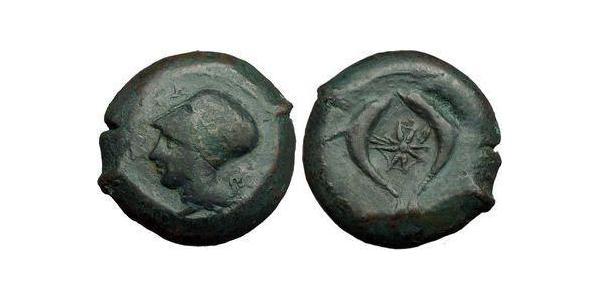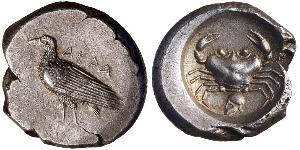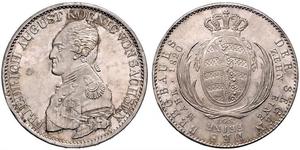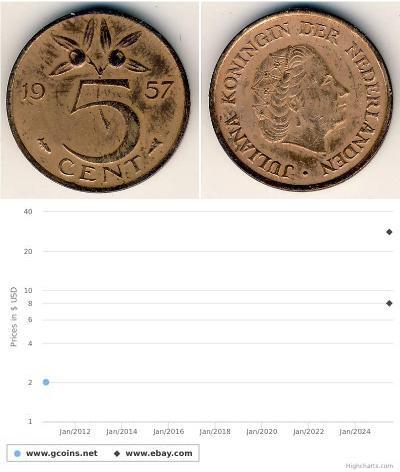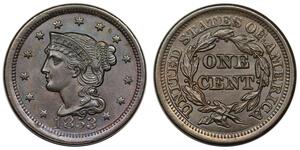[ 4876] SICILY: SYRACUSE: Dionysios I Bronze Drachm (30mm, 32.45 gm.) Struck: 395 B.C. Reference: SNG ANS 455. ΣYPA. Head of Athena left, wearing corinthian helmet decorated with wreath. Sea-star between two dolphins. Provided with certificate of authenticity. CERTIFIED AUTHENTIC by Sergey Nechayev, PhD - Numismatic Expert Dionysius I or Dionysius the Elder (Greek: Διονύσιος ὁ Πρεσβύτερος; c. 432 – 367 BC) was a Greek tyrant of Syracuse, in what is now Sicily, southern Italy. He conquered several cities in Sicily and southern Italy, opposed Carthage's influence in Sicily and made Syracuse the most powerful of the Western Greek colonies. He was regarded by the ancients as an example of the worst kind of despot—cruel, suspicious and vindictive. Early life Dionysius I began his working life as a clerk in a public office. Because of his achievements in the war against Carthage that had begun in 409 BC, he was elected supreme military commander in 406 BC; in the following year he seized total power and became tyrant. In subsequent years he consolidated his position ruthlessly. Mercenaries and Autocracy Dionysius the Elder’s victory over the democratic Syracuse represents both the very worst and the very best of the mercenary-leader. Dionysius’ career as a despot occurred after he was given six hundred personal mercenaries to guard his person after faking an attack on his own life. He was able to increase this guard to one thousand and gradually consolidated his power and established himself as a tyrant. He imposed his mercenaries on all parts of the polis community. Such an act would have truly wiped out any suggestion that democracy was still in force. His rule was “unconstitutional and illegitimate and could not fail to provoke rebellions among the partisans of democratic government”. Dionysius’ position at home would be threatened even as early as 403 by those philosophically opposed to tyranny. Interestingly, Sparta, which had in the past deposedtyrants from Corinth to Athens, did not damn Dionysius and his autocracy. In fact relations between the two were very positive: When the Lacedaemonians [Spartans] had settled the affairs of Greece to their own taste, they dispatched Aristus, one of their distinguished men, to Syracuse, ostensibly pretending that they would overthrow the government, but in truth with intent to increase the power of the tyranny; for they hoped that by helping to establish the rule of Dionysius they would obtain his ready service because of their benefactions to him. Dionysius would even have the privilege of being allowed to conscript mercenaries from lands under Spartan authority. The demise of a prominent democratic polis in the classical world and the subsequent tenure of Dionysius represented what would become a recurring norm in fourth century Greece, thanks to the prevalence of mercenaries. The mercenary and the tyrant went hand-in-hand; Polybius for example noted how “the security of despots rests entirely on the loyalty and power of mercenaries”. Aristotle wrote how some form of ‘guard’ (viz. a personal army) is needed for absolute kingship, and for an elected tyrant a very particular number of professional soldiers should be employed; too few undermines the tyrants power and too many threatens the polis itself. The philosopher notes how based on this observation, the people of Syracuse were warned to not let Dionysius conscript too many ‘guards’ during his reign. Conquests He fought a war with Carthage from 397 BC to 392 BC with mixed success; his attempts to drive the Carthaginians entirely out of the island of Sicily failed, and at his death they were masters of at least a third of it. He also carried on an expedition against Rhegium, capturing it and attacking its allied cities in Magna Graecia. In one campaign, in which he was joined by the Lucanians, he devastated the territories of Thurii and Croton in an attempt to defend Locri.Dionysius of Syracuse's military attempts ...
читати далі

|
Добавив:
anonymous 2015-08-18 |
Similar Coin Groups
2025-05-24
- Історичні ціни на монету
2025-05-23
-
Нові монети
Можливо, Вас зацікавить...

